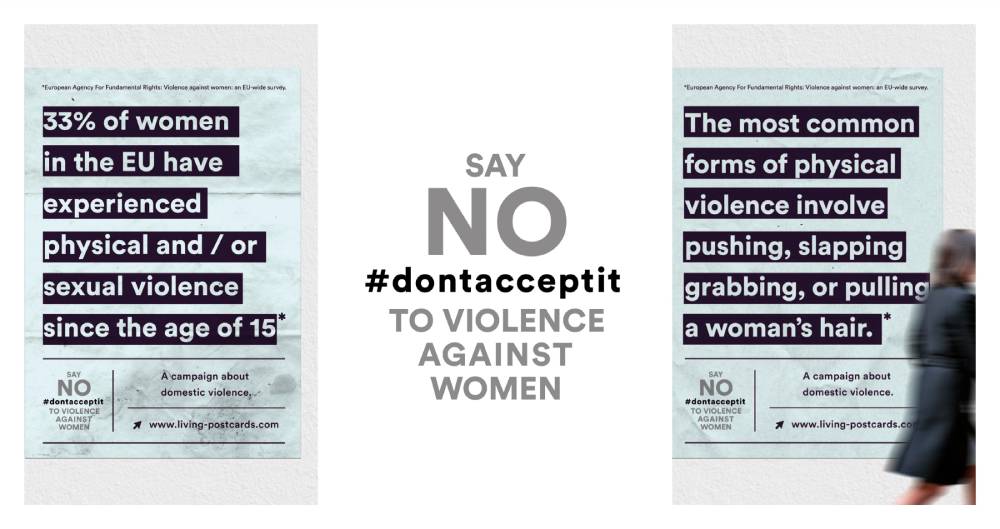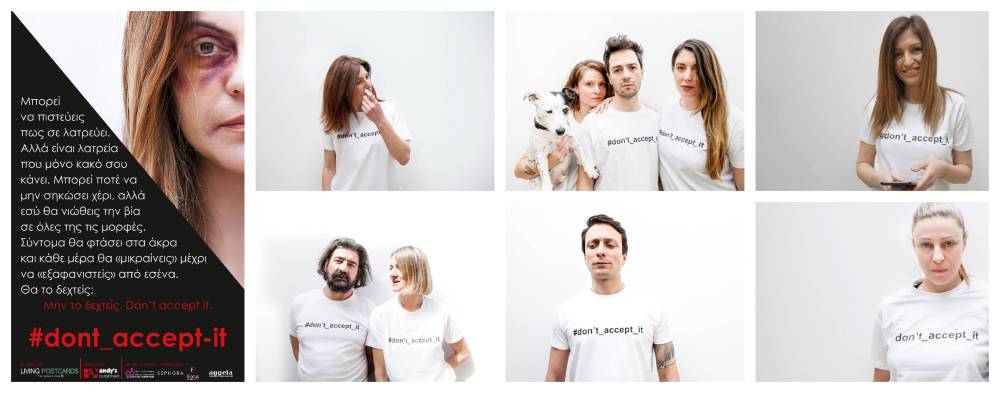Domestic violence affects us all

Ι was a child when the doorbell rang at 2 in the morning. My parents were worried and their first reaction was to look through the peephole in the door, who could it be? My aunt’s face was clearly seen, but not as we knew it. It was battered and dark. The aunt had left secretly, in the night, to escape her then-husband. We kept her at our house until she could feel safe and settle all her pending issues.
It took many years for me to understand that what had happened then was something that happened in many homes, only that not all women had the courage and strength to leave. In 2018, a random post on my personal social networks about incidents of violence against women had an impact of 10,400 shares, and hundreds of private messages for “help” and became the reason for the creation of an international campaign called #dontacceptit.
As time passed, I saw that the problem was big, much bigger than I could imagine at the time. Even before the campaign began, the evidence that had then come to light was more than terrifying. 80% of the cases pointed to the husband as the perpetrator. 5,041 calls and 113 e-mails in one year to the SOS-15900 Hotline for women victims of violence. 80% of the complaints made by the victims themselves related to incidents of domestic violence.
80% of the complaints made by the victims themselves related to incidents of domestic violence. The facts have unfortunately changed, as domestic violence has skyrocketed during the global lockdown. In 2021, more than 570 women were victims of domestic violence in Greece, according to the official data of EL.AS. That year, we had 17 femicides. And before 2022 ends, we’re already counting quite a few, with 3 of them happening within hours of each other. We often think of physical abuse as violence, but violence comes in many forms. It is verbal, emotional, financial, and sexual. The only easy thing is to say “why don’t they go?” Because it’s not easy. It is not. Abuse is well hidden under degrees, careers, nice clothes, and comfortable-cool-style. It is not characteristic of women who “have no fate in the sun”. It is not about irritable men who use excuses like financial insecurity, or fatigue.

It’s quite a bit more complicated, but it’s happening right next to us. Manipulative relationships are difficult because they are about “control”. Many times they hide under a shiny image, under degrees, diplomas, or social acclaim. The only thing that is certain is that there is no love behind every act of violence. There is no love, Love gives you wings to fly, it doesn’t chain your feet. So what should we do as a society? To educate our children. Boys and girls. Girls and boys.
Let’s not be ashamed to talk to them, and give them the trigger to talk to us openly about what is happening to them. There should be more information on the phenomenon. All organizations should join forces and fight together to deal with it. Many people wonder why we use the term “femicide” and not just “homicide”. According to the European Institute for Gender Equality (EIGE), “femicide” is defined as the killing of women and girls because of their gender. The term comes from the English word “femicide” and is used extensively in Latin America as a tool to address the alarming escalation of very violent killings of women and girls.
My aunt made a decision that apparently saved her life and led to her meeting a good man with whom she made a wonderful family.
Wishing all women to live the life they deserve and dream of.
What's Your Reaction?
Γεννημένη στην αγαπημένη της πόλη, την Αθήνα, έναν Απρίλη, αιώνες πριν. Σπούδασε marketing – τεχνικές πωλήσεων, διαφήμιση, δημόσιες σχέσεις, φωτογραφία κι υποκριτική. Δούλεψε σε πολλές εταιρείες στις πωλήσεις και στο κομμάτι του marketing και μαζί με την ομάδα της δημιούργησε την πλατφόρμα www.living-postcards.com, ένα site που προσπαθεί να προωθήσει στο εξωτερικό όλα τα όμορφα πράγματα της Ελλάδας εν καιρώ κρίσης.



